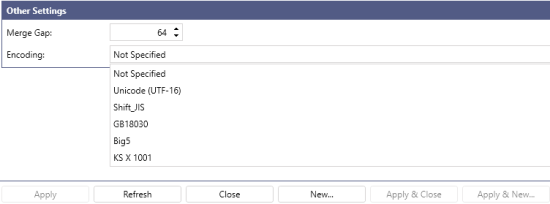Encoding Details
GENESIS uses ASCII encoding as the default setting for reading and writing STRING data. This causes garbled characters when you enter unsupported characters in ASCII encoding, such as Japanese Kanji. You can avoid garbled characters by selecting the appropriate encoding from the Encoding drop-down list under Other Settings in a MELSEC device configuration.

Supported Encoding
|
Display Name |
Encoding |
Language |
|---|---|---|
|
Not Specified1 |
ASCII |
English |
|
Unicode (UTF-16) |
Unicode (UTF-16) |
Multilingual |
|
Shift_JIS |
Shift_JIS |
Japanese |
|
GB18030 |
GB18030 |
Chinese (simplified) |
|
Big5 |
Big5 |
Chinese (traditional) |
|
KS X 1001 |
KS X 1001 |
Korean |
1 The application reads and writes STRING data in ASCII when encoding is not specified.
The encoding setting applies to all STRING data type tags under a device.
The String Length setting is based on ASCII (1-byte characters). Therefore, using an Encoding setting other than Not Specified reduces the number of usable characters by half or even more. Make sure to set the string length large enough to store all characters.
When using multibyte characters (e.g. Shift_JIS character) for a STRING data type, each multibyte character will consume 2 to 4 StringLength units. For example, 16 multibytes (2-byte) characters can be stored in the STRING data if its StringLength is 32.
See Also: